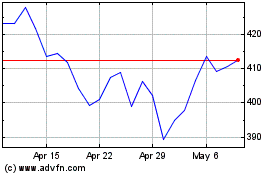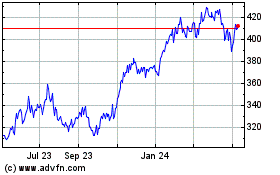By Joanna Stern
What do you do when the president of the U.S. says he plans to
ban your favorite app? You dance.
What do you do when news breaks that Microsoft Corp. may save
it? You dance even harder.
Following President Trump's statement on Friday evening that he
planned to ban TikTok, I did what any TikTok fan would do: Fired up
the app and got lost in an endless stream of short music videos --
and I do mean endless.
There was the #savetiktok dance challenge. There were tears --
so many tears. There were calls for petition signatures. And, there
were oh so many "Follow me on [insert other social media network
here]!"
Over the weekend, while White House officials, executives from
TikTok's Chinese parent company ByteDance Ltd. and Microsoft
scrambled to sort out a deal that would keep the app alive in the
U.S., TikTokers were TikToking like there might be no tomorrow,
capturing -- and joking about -- the social media platform's highly
uncertain future.
Some offered tips on how to use a VPN (or virtual private
network) to make it look like you were accessing the app from
another country. Others pretended to pack their actual bags to
relocate to a TikTok-permitting country.
All this, of course, because the app has become a China-U.S.
geopolitical ping-pong ball. A quick recap: The Trump
administration raised national security concerns over the app,
which has over 100 million U.S. users. Microsoft swooped in,
holding talks to acquire the U.S. operation from ByteDance. Then on
Friday evening: "We're banning them from the United States,"
President Trump said. Then Sunday: The Microsoft talks are back
on.
Yeah, it's A LOT -- especially for TikTokers themselves.
"Everyone is running around like a chicken with their head cut
off," said Hope Schwing, 22 years old, who has eight million
followers on the platform. "TikTok has become such a big part of my
life...It's a safe place and great for expression."
When I asked her and others with large followings about the
alternative apps, I heard the same thing: They're not TikTok, you
dummy!
The infectious app, which really is a lot more than just
constant lip-syncing and dance moves, has hooked us big time with a
combination of elements. Add them all together and you can see why
U.S. officials are anxious, why a company like Microsoft would
involve itself in the mess and why others, like Facebook, are so
eager to imitate its features.
A TikTok-like feature that allows users to record and edit short
videos set to music, called Instagram Reels, will launch this week
or next week to Instagram users, according to a person familiar
with the new feature.
Endless Fun
I'm willing to bet at least a dollar that even your humorless
uncle who hasn't chuckled since a George Carlin stand-up would open
TikTok and find something that makes him laugh.
Sure, the same could be said of YouTube or Instagram, except the
TikTok algorithm is much more aggressive at quickly figuring out
what types of music and videos get your attention. The main "For
You" feed is a hyper-personalized parade of generally
15-to-60-second, often-musical clips that just never ends. Swipe
up, new video; swipe up, new video; swipe up, new video. TikTok
keeps learning and analyzing what you do and keeps the videos it
thinks you'll like coming...forever.
What you get is a stream of entertainment that's hard to put
down. And even as some politics and social issues have started to
creep in it's often presented in a lighter, community-minded manner
by younger creators.
You could see how that could be viewed as an American security
concern from a Chinese-owned app. What kind of propaganda could be
fed through the system? What could be gathered about users'
tendencies, interests, patterns? TikTok has repeatedly denied
sharing user data with the Chinese government. In late July TikTok
CEO Kevin Mayer said the company would begin disclosing more about
how its algorithms work.
You could also see how that immersive audience and amount of
time spent in an app, which is free and is supported by
advertising, could be quite attractive to a tech giant, like
Microsoft -- or Facebook. Yet given Facebook's already sprawling
control over the social media sphere and the increased scrutiny of
it, Mark Zuckerberg and Co. have opted to imitate features with the
forthcoming Instagram Reels feature.
"It's identical to TikTok. They did a great job designing it,
but it's so similar. You can save your drafts, the videos are
roughly 15 seconds long, you can dance to music," said 17-year-old
Carrie Berk, who has half a million followers on TikTok and has
been trying out an early version of Instagram Reels. "But I can't
tell how big of an audience it will reach. It's too early to say
what the success of Instagram Reels will be like for me."
Over the weekend Ms. Berk posted a TikTok encouraging her
followers to save TikTok. One tip? Change your iPhone's region to
Canada. (For what it's worth, that setting is more for Apple's own
Apple ID and is highly unlikely to work.)
Endless Fame
The second major part of the TikTok success equation? An
algorithm and app design where success doesn't depend on followers
counts but videos that are worth being seen.
"It doesn't matter if you have 30,000 followers or none on
TikTok, if it is a good video it can still go viral," said
22-year-old Michael Le, who goes by @justmaiko on TikTok and has
35.6 million followers. Mr. Le lives in a house in Los Angeles,
called the Shluv House, with four other social media influencers
who create videos together, mostly for TikTok. He posted a number
of times over the past few days about the ban, including one video
he claimed would be his last.
In anticipation of a ban, many have looked at emerging
social-video apps, like Triller, Clash and Byte (no relation to
ByteDance). A Byte spokeswoman said the app has seen a big rise in
sign-ups and activity in the past few weeks. Byte and Triller were
the top apps in the Apple App Store on Sunday evening.
But what creators don't yet have on those nascent apps are large
brand and sponsorship deals. Mr. Le and others shared concern that
a ban or service disruption to the app would have an impact on
their livelihood, and that deals likely couldn't be transferred
over to another platform like Instagram or YouTube.
"I have a few beauty and fashion brand deals coming up. I'm
hoping it doesn't get banned in the next week," Carrie Berk told
me.
When I asked if she could share how much money she has made
through TikTok she told me to hold so she could ask her mom if that
was OK. She came back to the phone: "I made more than I would have
made babysitting."
You see, it's that infectious hold on the most sought after
demographic in the tech industry that explains why TikTok ended up
in a geopolitical vise, and why TikTokers -- and the world's
biggest software company -- think it's worth going to great lengths
to save.
-- For more WSJ Technology analysis, reviews, advice and
headlines, sign up for our weekly newsletter.
Write to Joanna Stern at joanna.stern@wsj.com
(END) Dow Jones Newswires
August 03, 2020 11:17 ET (15:17 GMT)
Copyright (c) 2020 Dow Jones & Company, Inc.
Microsoft (NASDAQ:MSFT)
Historical Stock Chart
From Mar 2024 to Apr 2024

Microsoft (NASDAQ:MSFT)
Historical Stock Chart
From Apr 2023 to Apr 2024
